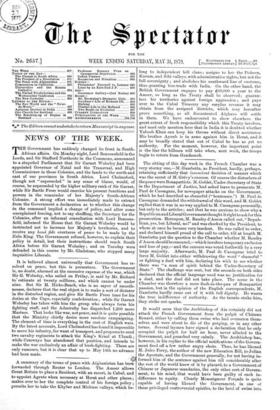The sitting of this day week in the French Chamber
was a very stormy one,—M. Gambetta, as President, hardly, perhaps, retaining sufficiently that insouciant decision of manner which was the secret of M. Grevy's success. Of course the disturbers of the peace were Bonapartists. M. Goblet, Under-Secretary of State in the Department of Justice, had asked leave to prosecute M. Paul de Cassagnac, for newspaper attacks on the Government, which he had described as shameful (" honteuses.") M. Paul de Cassagnac demanded the withdrawal of this word, and M. Goblet replied that it was in no way applied to M. Cassagnac personally, but only to the articles ; and that he was anxious to show why a Republican and Liberal Government thought it right to ask for this prosecution. Hereupon, M. Baudry d'Asson called out, "Repub- lican, yes, but Liberal, no!" and was checked by the President, to whom at once he became very insolent. He was called to order, and declared himself proud of the call to order, till at length M. Gambetta put the question to the Chamber whether M. Baudry d'Asson shouldbecensured,—which involves temporary exclusion and loss of pay,—and the censure was voted forthwith by a very large majority. Afterwards, M. Paul de Cassagnac tried to force M. Goblet into either withdrawing the word " shameful "
or fighting a duel with him, declaring his wish to see whether there was "a man of spirit behind the Under-Secretary of State." The challenge was sent, but the seconds on both sides declared that the official language used was no justification for a duel, and the duel did not take place. The scene in the Chamber was therefore a mere flash-in-the-pan of Bonapartist passion, but in the opinion of the English correspondents, M. Gambetta hardly came out of it with full dignity. He wants the true indifference of authority. As the taunts strike him, they strike out sparks.


































